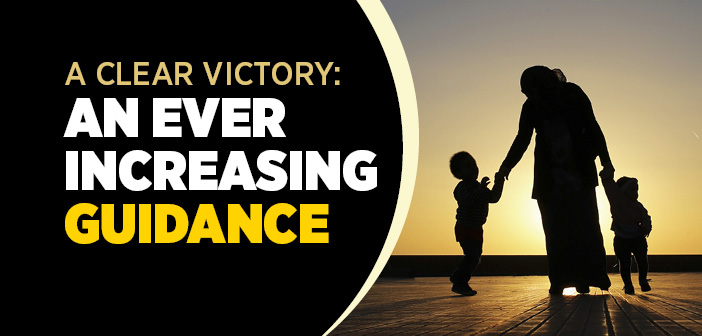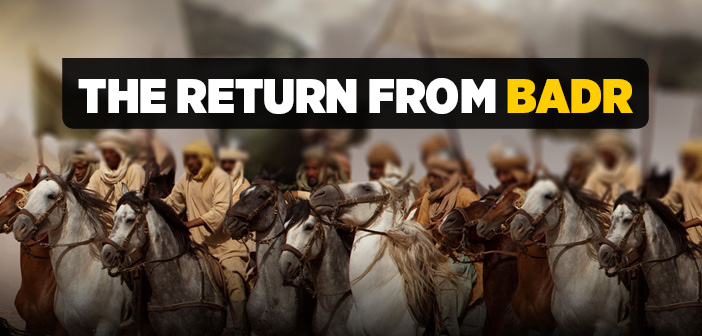What is a clear victory in islam?
The idolaters, elated to have had the terms of Hudaybiyah accepted, had in actual fact unknowingly removed one by one the barriers preventing the Believers from extending the call and had placed them in a superior position with their own hands. That nearly none of the Companions were willing to acknowledge the terms of the treaty, thinking they were blatantly to their disadvantage, had cast a further drape in front of Qurayshi eyes, as they signed the treaty with greater enthusiasm, with an air of having won an enormous victory. However, the true nature of the treaty, concealed even to the Believers to begin with, only became manifest in time as the terms were put into practice.
The Blessed Prophet -upon him blessings and peace-, who very well knew right from the start the blessings the treaty had in store, was delicate in keeping to the terms of Hudaybiyah and in making the most of the opportunities provided once they arose. For instance, when a group of Meccan women came to Medina seeking protection, the Messenger of Allah -upon him blessings and peace- refused Qurayshi demands to hand them over on grounds that the relevant term of the treaty applied only to men. Allah, glory unto Him, had in fact commanded against their extradition:
“O you who believe! When believing women come unto you as fugitives, examine them. Allah is Best Aware of their faith. Then, if ye know them for true believers, send them not back unto the disbelievers. They are not lawful for them (the disbelievers), nor are they (the disbelievers) lawful for them. And give them (the disbelievers) that which they have spent (upon them). And it is no sin for you to marry such women when you have given them their dues. And hold not to the ties of disbelieving women; and ask for (the return of) that which you have spent; and let them (the disbelievers) ask for that which they have spent. That is the judgment of Allah. He judges between you. Allah is Knower, Wise.” (al-Mumtahinah, 10)[1]
Meanwhile, Abu Basir, a Meccan who had now accepted Islam, had come to Medina seeking protection. Compelled by the terms of the treaty, the Blessed Prophet -upon him blessings and peace- had no other choice than to hand him over to the idolaters. Like the others, Abu Basir found it difficult at first to make sense with the move. Astonished, he even asked whether the Blessed Prophet -upon him blessings and peace- wanted him to go back to worshipping idols. But as calm as ever, the Blessed Prophet -upon him blessings and peace- assured Abu Basir that they could not turn back on their word, counseling him to “…be patient, for Allah the Almighty will soon show you and others alike a way out.”
Abu Basir yielded to the will of the Prophet -upon him blessings and peace-. Putting the wellbeing of Muslims before himself, he surrendered to the idolaters. Still, he was now a dead man walking, for he knew the idolaters were taking him not to Mecca but to death. Knowing this, he put up a fierce resistance when the first opportunity presented itself. Of the two who were taking him, he killed Hunays and watched as the other one fleed. Abu Basir took the dead idolater’s clothes, belongings and sword and returned to the Prophet of Allah -upon him blessings and peace- .
“Take a fifth of these, Messenger of Allah”, he said.
‘If I do”, replied the Blessed Prophet -upon him blessings and peace-, “I will not have complied with the terms of the treaty. Your act and the belongings of the man you killed concern you.” (Waqidi, II, 626-627)
The idolater, who had fled, also wound up back in Medina asking for Abu Basir.
“You were true to your word when you handed me over to them, Messenger of Allah…but I had to save my life”, this time Abu Basir said.
Now, beginning to realize the wisdom behind the advice given him by the Blessed Prophet -upon him blessings and peace- , Abu Basir left Medina and settled in a place called Is, on the shore between Mecca and Damascus. In a short amount of time, Is ended up becoming neutral zone that served as an asylum center for all the runaway Muslims. Very soon, the number of Muslims, including Abu Jandal who was also able to make a successful getaway, reached three-hundred, jeopardizing the vital Meccan trade route to Syria, causing much damage to Qurayshi trade. The idolaters were left with no other choice than to insist the Blessed Prophet -upon him blessings and peace- cancel the relevant term of the treaty. They now demanded the Prophet -upon him blessings and peace- accept Muslim refugees into Medina. Thus, a term that had initially appeared detrimental to Muslim benefit had now proved to be quite the opposite.[2]
The Blessed Prophet -upon him blessings and peace- thereupon sent a letter to the Muslim community of Is lead by Abu Basir. At the time, Abu Basir happened to be on his deathbed and actually breathed his last as he completed reading the letter. Abu Jandal had him buried where he died and had a mosque built right next to his grave, after which he lead his fellow Believers to Medina, to the Prophet of Allah -upon him blessings and peace-.[3]
The peace environment established through Hudaybiyah, a treaty the Almighty describes as a ‘clear victory’ (fathan mubinan) proved a turning point in the acceleration of the Islamic call.[4]
When the Blessed Prophet -upon him blessings and peace- declared Hudaybiyah to be a major triumph, a Companion commented, “We have been prevented from circumambulating Kaabah, from offering our sacrifices inside the Haram, and moreover handed over two people seeking our protection…what sort of a victory could this be?”
The Noble Prophet -upon him blessings and peace- overheard these comments, upon which he described the nature of the victory gained at Hudaybiyah:
“Indeed, this treaty is the greatest victory. The idolaters have agreed for you to come and go into their lands and see to your obligations and for you to be safe as you travel to and fro. Thus they will now see and learn from you the Islam they have detested until now. Allah will make you victorious and you will profitably return from where you enter, safe and sound…And that is the greatest victory of all!” (Halabi, II, 715)
Abu Bakr -Allah be well-pleased with him- struck a chord with his opinion on the treaty, when he said, “Islam has never seen a victory greater than that of Hudaybiyah. But being shortsighted and narrow-minded, many objected to it. People are haste in matters that are between Allah and His Messenger. But unlike them, Allah the Almighty is not haste and does not carry anything out until the right moment has arrived.” (Waqidi, II, 610; Halabi, II, 721)
The first positive result of the treaty was the rapid spread of Islam. Many previously blocked avenues were now wide open for the Call. Muslims were now able to come together with the idolaters and openly talk about and invite them to Islam. Even those who had kept their Muslim faith hidden until then could now fearlessly come out.[5]
Yet before, the two parties could not freely interact with one another, let alone travel freely to Mecca or Medina as they did following the treaty. Both the Believers and the idolaters now exercised the freedom to visit family and friends on either side. The Blessed Prophet’s -upon him blessings and peace- behavior, exemplary morals and conduct, as well as his miracles had now come out into the daylight of Qurayshi observation; and along with the corresponding advice eagerly given by the Believers, the idolaters were now finding themselves irrevocably leaning towards Islam. Besides, the Arabs of the desert were practically waiting for the Meccans to become Muslim to follow suit. It was during this period that Meccan notables of the likes of Amr ibn As, Khalid ibn Walid and Othman ibn Talha entered the fold of Islam.[6]
Muslim envoys enjoyed the freedom of visiting any region they wished and explained Islam at every opportunity. The number of Muslims significantly rose during this spell of peace.
Drawing from the relevant ahadith of the Noble Messenger -upon him blessings and peace-, Imam Zuhri evaluates the consequences of the Treaty of Hudaybiyah in the following words:
“Previously, Muslims and idolaters had come into blows whenever they encountered each other. With the Treaty of Hudaybiyah, warfare came to an end. A bond of trust was established between both sides. They were able to meet and fuse with each other, even aiding one another in various matters. In the meanwhile, whenever Islam was raised to someone, after giving it a brief thought, he would grasp the truth and become Muslim; such that the two year period between Hudaybiyah and the conquest of Mecca witnessed a greater number of people becoming Muslim than the entire nineteen year period of the call upto the treaty.”
To this, Ibn Hisham adds, “The Messenger of Allah -upon him blessings and peace- had come to Hudaybiyah with one-thousand-four-hundred Believers. Two years later, he left for Mecca with ten-thousand, and according to another account, with another two-thousand that joined him on the way, making the number twelve-thousand. These statistics attest to the degree of accuracy of Zuhri’s remarks.” (Haythami, VI, 170; Ibn Hisham, III, 372)
[1] See, Bukhari, Shurut, 15; Waqidi, II, 631-632.[2] See, Bukhari, Shurut, 15; Ibn Hisham, III, 372.[3] See, Waqidi, II, 629.[4] See, al-Fath, 1.[5] See, Ibn Qayyim, III, 309-310.[6] See, Waqidi, II, 624.
Source: Osman Nuri Topbaş, The Prophet Muhammed Mustafa the Elect II, Erkam Publications





